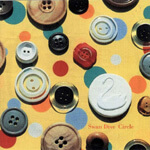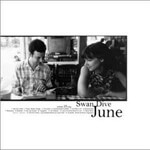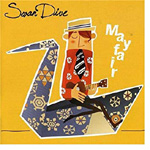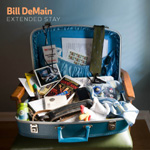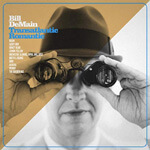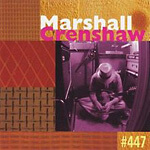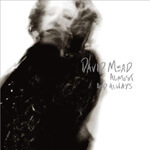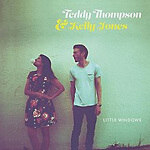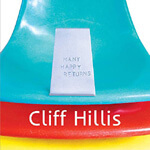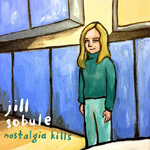Songwriter, Grammy-nominated rock journalist, and Nashville tour
guide, Bill DeMain is a hard man to keep up with. Between his
nearly two-decade run with the internationally renowned pop duo,
“Swan Dive,” his critically acclaimed solo albums, and his many
dozens of collaborations with the likes of
Marshall Crenshaw,
Mike
Viola, and
David Mead, you would need mass quantities of time to
assimilate everything he’s published. Luckily for you, you’re
about to embark on your own guided tour — podcast style — to the
many sides of Bill DeMain. Before we get started, let’s hear a few
samples of the music that’s in store:
[BEGIN AUDIO MEDLEY]
- Begin (Bill
DeMain)
- Girl On a Wire
(Swan Dive)
- Lemon Yellow
(Bill DeMain)
- Circle (Swan
Dive)
[END AUDIO MEDLEY]
Dave Caruso: “Bill DeMain, welcome to Songwriter Stories.”
Bill DeMain: “Glad to be here. Thanks for having me.”
DC: “Over the course of your career, I’ve noticed that you’ve
written a good number of songs that were recorded by female
singers, most notably by your Swan Dive collaborator, Molly
Felder.
Was writing for women singers something you set out to do, or did
you just find that you liked it, you were good at it and it was
working for you?”
BDM: “Wow, that’s an interesting question. I think that I never
really set out to write for either male or female singers. But
after I met Molly, which was early on in my Nashville journey, I
think through working with her I became a bit more sensitive to
female singers... and then I started to write with female singers.
And it’s weird, when I look back at the last thirty years of music
that I’ve made, so much of it is either in a band with a girl
singer or I’ve written with girl singers like
Jill Sobule and
Kim
Richey. In fact, I’ve got a good friend coming in tomorrow for a
couple days to write with me. Her name is Charlie Faye [& The Fayettes]. She has a 60s-style girl group down in Austin.
So yeah, I think — I don’t know why. I never had a sister growing
up — maybe it’s that if you wanna psychoanalyze it. [Laughs.] I
get along with women really well. And I think maybe because I’m a
sensitive guy, I suppose, that I just work better with them.”
DC: “It’s obviously working for you, I mean, that’s a beautiful
thing.”
BDM: “Yeah.” [Laughs.]
DC: “Do you know who the band
Squeeze is?”
BDM: “Oh, of course, yeah.”
DC: “Okay, so
Chris Difford of that band (he’s the lyricist), he
became known for writing several songs which intentionally spoke
from a woman’s perspective, although the songs were sung by his
writing partner,
Glenn Tilbrook. Do you notice that there are
elements of a woman’s narrative voice, your own voice, or a
narrative-neutral voice that filter through during a performance?
Sometimes, even within the same line or phrase, it seems to me
that that dynamic of a male songwriter with a songstress adds
another layer of richness to your songs. Can you think of any Swan
Dive songs that speak to that?”
BDM: “Oh... gosh, let’s see... Well, I’d say that I always aim to
make the point of view applicable to both male and female emotion.
So sure, I think because I have known Molly for so long, I sort of
know her background, and we’re friends, so I know emotional stuff
that she goes through, probably I do try to put some of that in a
song but not in a way that it would be so specific that it would
be just for her, you know?
When I think about what you just said to set up this question, the
first thing that comes to mind is probably one of my favorite
songwriters,
Burt Bacharach and
Hal David, and their relationship
with
Dionne Warwick, which I think was always — maybe that was the
first pop music I really loved, ‘cause my mom played it around the
house all the time. I think somehow that filtered into what I do.
I think Hal David was just really sensitive to matters of the
heart, whether it male or female. And you look at some of the
songs he wrote specifically for Dionne Warwick, were later covered
by men. So it could go either way.
So I think, no, I don’t ever feel myself being conscious of making
this a specifically female point of view, unless the word “he” is
in it, or it’s gonna be that kind of third-person song where it
references a guy.”
DC: “What’s interesting to me is that at some point, I don’t know
that much about you and Molly but I know based on an interview I
read that she lives in Seattle now and you’re not, so let’s say
you’re going to be doing some show in the future and you’re doing
a Swan Dive song that you didn’t originally sing on the record. It
probably will come across differently, not only to yourself but
also to the people listening. Just that there’s a male perspective
inserted on it, even if it was neutral to begin with. It’s
interesting.”
BDM: “Yeah. That’s a good point. And I have done that before. Part
of the thing for me is that it’s hard to sing those songs because
I’ve heard them so long and Molly is such a professional singer
and I’m more of a songwriter who sings. So sometimes I feel a
little intimidated, to be honest, even though I wrote the song, to
try to sing it after she has sung it. But I have done it and yeah,
you’re right — it does, it brings out different feelings in it.
Different timbres in the sound of the song. It’s interesting.”
DC: “Let’s talk about Swan Dive, [in] which Molly Felder was the
girl singer and you sang too —“
BDM: “I did.”
DC: “And that was between 1997 and 2014, I counted eleven albums
without compilations. Is that about right?”
BDM: “That’s right. Eleven records. That’s a lot. That’s a long
run.”
DC: “Wow, right?”
BDM: [Laughs]
DC: “Yeah! The reason I’m covering Swan Dive first is because it’s
the biggest cross-section of your material.”
BDM: “Definitely, yeah.”
DC: “There may have been some other arrangers and producers
involved with those albums, but is it accurate to say that you
pretty much always had executive control over the sound of Swan
Dive?”
BDM: “I would say from the first album to the last, it was always
a collaboration of our producer,
Brad Jones, with me and Molly.”
DC: “Great. So was Brad there all along?”
BDM: “Brad produced ten of the eleven, yep.”
DC: “And Brad is also a connection that you share with David Mead,
which we’ll get to later.”
DBM: “Yes.”
DC: “Is Swan Dive a democracy in terms of what songs you record?
And the reason I ask that is — do you ever write something and
then Molly does it with you and says, ‘this isn’t for me,’ or the
two of you agree it isn’t working right — or do you always know
when you get to that stage that it’s ready?”
DBM: “There have certainly been songs that we’ve put aside. Maybe
not so much because she didn’t want to sing it, but because others
rose to the top. I think for every album we made, really, we
probably had twice as many songs as we recorded.”
DC: “Which is why you ended up with two albums in the first year,
right?”
BDM: “Yeah. Part of me always wished for that ‘60s-era album
timetable where people did put out two or three albums a year,
because I always felt like I was writing a lot and it would’ve
been nice to put all that stuff out. At the time, that’s how I
felt. In retrospect, I think it’s probably okay, because I feel
like we did probably put out the stuff that was the best. And when
I look now at a lot of the things that we might’ve demo-ed but not
actually released, it’s like, ‘Okay, I’m okay with that not being
out there,’ you know?”
DC: “Let’s talk about the creation of a few Swan Dive songs that I
picked out —
BDM: “Sure!”
DC: “— from different records. They may seem random to you,
because I’m not just picking hits, I’m picking songs that just
appeal to me for [this] show.”
BDM: [Laughs] “Okay, sure.”
DC: “And feel free to share any details about the process or how
the song came about or where it came from, arranging and
recording... anything you think is interesting.”
BDM: “Okay.”
DC: “We’re gonna start with the ‘You’re Beautiful’ album, 1997,
the song is ‘Beautiful Excuse.’
[AUDIO CLIP: 'BEAUTIFUL EXCUSE,' as recorded by SWAN DIVE]
DC: “Whose idea was the melody, chords and instrumentation of the
intro? Was that all you?”
BDM: “No, actually, it’s interesting you picked that song because
I wrote that with a guy named Ross Rice, who is the former singer
of
Human Radio. [Note: He’s still the singer and the band is still
active as of this interview.] They were out of Memphis. And Human
Radio were signed to CBS, I think for two albums that they did.
Molly and I were big fans, so we sort of met him as fans and then
he ended up moving from Memphis to Nashville and fell in with the
whole creative posse around Brad Jones and his studio. So we got
to know him.
Ross and I have written a couple of songs together over the years
but that was the first song we wrote and I remember I had that
title, ’Beautiful Excuse’ and that title phrase line. It was the
two of us in a room together and we worked on it for four or five
hours. But I remember he had that [hums] intro thing that had
those odd, dissonant chords, that sounded a little bit like Human
Radio. So as soon as he played it, I was like, ‘Oh, man, I’m in!’
And actually, it sounds a little bit more like Human Radio than it
does Swan Dive. When I think about that song now, I don’t really
think that’s like a typical Swan Dive song. It stood out in a
way.”
DC: “No, but it *fits*.”
BDM: “It fits. Okay, that’s good.”
DC: “... when you hear it in context. But when you hear it out of
context... if you were to hear a bunch of, let’s say ‘Bossa Nova
songs’ in a row — that sounded Bossa Nova-y, and then you heard
that one you’d go, ‘ooh... this one really sticks out.’ But when
you hear the breadth of your career it doesn’t stick out at all,
because you’ve done so many different kinds of pop, and around the
edges of pop and things.
I was gonna say the verse is really nice. I really like the verse.
You wrote that, I’m sure? Or did he write that?”
BDM: “Once he had the intro, we just started going back and forth.
My guess is that he probably would’ve written more of the music on
that song and me more of the lyric, just because that’s the
relationship that he and I have.
It’s interesting — I don’t know what songs and what collaborators
you’ll ask me about, but I write both music and lyrics and I’ve
written a lot of songs by myself, but I always find it interesting
when you get with certain people, there’s just a natural,
complementary relationship that emerges out of a collaboration.
And you find yourself saying, ‘Okay, I’m gonna be more of the
melody guy in this relationship,’ or ‘I’m gonna be more of a lyric
guy,’ or ‘we’re gonna be totally democratic and it’s just gonna go
back and forth.’ So with Ross I think I’ve been more of a lyric
guy.”
DC: “Well, the chorus gets an extra lift when the vocal harmony
comes in for the title, and that’s a good, valuable thing for a
songwriter to do — to call attention to the title. But what I love
is that when the chorus ends, it ends on “I have nothing better to
do,” and the word do is on tonic, or the name of the key, the note
that’s “Do” [in the scale]. And the easy thing to do would be to
end on a tonic chord. And it would also be kind of not
interesting. But instead, you come back to that really cool intro
with odd notes and chords. And it’s so(!)... fun(!)... when you
hear it the second time.
[AUDIO CLIP: 'BEAUTIFUL EXCUSE' (end of Chorus to Intro)]
BDM: “Well thanks! Again, I would give more credit to Ross for
that move because... especially back then, I hadn’t moved into
phases like three or four albums on where I started getting into
key changes and modulations. So I probably learned a lot from
Ross, but yeah, that was his cleverness and his musical
creativity.”
DC: “Well, it was gutsy to let it happen and gutsy to like it. You
said ‘I like that, I want that on my record,’ and you didn’t have
to do that, you could’ve said, ‘that’s nothing like me.’ So you
recognized it.”
BDM: [Laughs]
DC: “Are you ready to move onto ‘Circle,’ 1998?”
BDM: “Yeah, yeah!” [Laughs]
DC: “I picked out ‘Better to Fly.’”
[AUDIO CLIP: 'BETTER TO FLY,' as recorded by SWAN DIVE]
DC: “I think this arrangement’s so good from start to finish. You
never get a chance to get bored. You know, it’s based on that
little trundling guitar part?”
BDM: “Oh, right!”
DC: “And what’s that happening with the bass sound? It sounds like
it’s fretless but maybe it’s more than that. You know how it’s
kinda buzzy?”
BDM: “That was Brad... gosh, if I remember, on that album, Brad
played a lot of electric bass. It was an old, Gibson hollow-body
that was sort of his “pet bass” back then. But a lot of times, he
would double his bass, either with standup bass or with like a
Moog on different parts. You know, he’s a fantastic bass player.
Just any bass you put in his hands, he can play wonderful,
super-musical stuff. But he’s also a real creative guy with sound,
so he’s always sneaking in little doubles...”
DC: “So he’s doing like the [studio bassist]
Carol Kaye /
Brian
Wilson ‘layering basses’ thing.”
BDM: “Yeah!
DC: “That’s kind of cool. Anything else you want to say about that
song?”
BDM: “I wrote that song by myself. It was inspired by... I got
this mad crush on an actress that I met in New York City. Prince
Charles told me never to drop names, but [laughs]...”
DC: [Laughs]
BDM: “She was the daughter of Olympia Dukakis, that actress. And
she looked like her mom. She was like a young version of her mom
and she was super pretty and witty. I met her at a theater party
in New York. And it was just one of those things where I was sorta
starstruck. And I got on the plane the next day and flew back to
Nashville, and I wrote most of the song on the plane, thinking
about her. And it was cool, because I wrote the words and the
melody. I didn’t have a guitar, so I think that enabled me to come
up with that weird riff that starts it. Because if I’d had a
guitar and had that melody, I probably would’ve gone with
something simpler — maybe just some strummed chords. I really like
that song and that was a valuable lesson; something I always try
to remember as a songwriter: sometimes it’s good to get away from
the instrument, you know?”
DC: “100% agree with you. I do it most of the time when I write. I
write everything in my head. I make notes to myself so I know what
I meant by something. I record, I’ll sing, I’ll say ‘that’s
tonic,’ or ‘that starts on this beat.’ But I don’t like to pick up
the instrument because you go for your familiar fingerings. You go
for the same things that you normally reach for. But in your head,
there’s this open palate that you can get more access to. And then
you have to find *that*. And that’s more interesting to me.”
BDM: “Yeah. To be fair, it works. When you write songs for a long
time, it’s good to have a lot of tools in your toolbox and a lot
of different ways to get things rolling. So sometimes, it’s okay
that you find a few chords on the piano and it’s like, ‘wow! that
really creates an atmosphere,’ and then melody and words start to
come through *that* doorway.”
DC: “Fantastic. By the way, was there a play-on-words when you
[recorded the albums called] ‘Mayfair’ and ‘June?’ Did you have an
album ‘Mayfair’ and and album ‘June?’”
BDM: [Laughing] “That’s right. You’re the first person who’s ever
said that and I don’t think I’ve ever thought about it until you
just said it. Wow, that’s cool. No, it wasn’t intentional.”
DC: “Oh, so there’s no pattern, okay.”
BDM: “Yeah, there’s no pattern.”
DC: [Laughs] “I get credit for it but nobody cares.” [Laughs]
BDM: [Laughs]
DC: “In 2004, you had the album, “William & Marlis,” am I saying
that right?”
BDM: “Yes, ‘Marlis.’ That’s Molly’s given name, ‘Marlis.’”
DC: “Alright, so ‘Sleeper’ was very different from a lot of the
other music you did.”
[AUDIO CLIP: ‘SLEEPER,' as recorded by SWAN DIVE]
DC: “There’s a couple lines in there: ‘You wanted something more /
I wanted something marvelous there.’ And then: ‘Climb a mountain
in the dead of winter.’ So there are some good lines in there,
too.”
BDM: “That song, I remember exactly how it got written. I wrote
just the lyrics for it and didn’t have any music. And by that
point, I had been writing songs for a couple years with one of my
favorite collaborators, a guy named
Gary Clark. Gary used to sing
with a group called, ‘Danny Wilson.’ Went on to become a producer
and worked with Natalie Embruglia.
Anyway, I emailed him that lyric. And now he lives in Scotland but
at the time he lived in London. And even though we wrote together
in person a few times when I was in London, we did a lot of email
collaboration like that. And I just sent him the lyric and he sent
me back that tune, without changing a word. I was like, ‘Damn!
That was really right on.’ It totally captured the mood of what
the song was about.
And on his demo, he used a drum machine. So I think that’s why we
did too, because we just kinda liked the feel of the demo.”
DC: “Yeah, and I think it made Molly sing a certain way. The whole
thing came across very sleepy, very, you know, it was nice.”
BDM: “Yeah, it’s a sad song, too. But yeah, I agree. I think
probably that setting of a drum machine — I can’t remember what
the instrumentation was on that song, but — it probably did bring
out a different color in her voice. You’re right.”
DC: “‘Popcorn and a Mama Who Loves Me Too,’ 2005. Is that your
title?”
BDM: “No, that is a very obscure reference to a saying that a
friend of mine back in high school had. I can’t even remember why.
Honestly, Dave, I think we were stuck on a title for that
record...”
DC: “Yeah. [Laughs] It’s as good as any!”
BDM: “Well, no... I think the only reason we chose that was
because at that point we were deep in our relationship with
Japanese labels. I think we made that one for JVC. And I don’t
know if you’ve been to Japan before, but often the way that they
market things — everything from candy to toothpaste, they’ll
market it with a Japanese name, and then an English name that’s
some totally bizarre amalgam of English words. So ‘Popcorn and a
Mama Who Loves Me Too’ — when we told that to them they were like,
‘Oh, cool!’ [Laughs] They didn’t even ask what it meant! Because
it sounded... that’s when we knew it sounded so weird and so
Japanese, you know?”
DC: “Perfect! Well the song I picked is not... I’m gonna be more
down the middle this time with you: ‘You Are My Superstar,’ which
I think is a great song.”
[AUDIO CLIP: 'YOU ARE MY SUPERSTAR,' as recorded by SWAN DIVE]
DC: “As it goes along, the sax and cowbell music break comes in
and then it kinda goes deep into R&B territory at the end. Even
Molly starts singing differently. It’s very nice. Do you have
anything to tell us about it?”
BDM: “Yeah, so I wrote that song with another one of my favorites,
Jill Sobule. And I had that melody on the verse, that sort of IV/5
to V thing with that Hall & Oates kind of chords to it...”
DC: “Yeah!”
BDM: “And I started singing that with, I think, some dummy lyrics
and I love writing with Jill because she has so much energy. It’s
almost like once you put the ball in the air, it’s just a
continuous volley that goes back and forth. The reason I like it
so much is it tends to push the song forward in a really energetic
way. And I think almost everything I’ve written with Jill has
gotten completed within two or three hours.”
DC: “That’s great!”
BDM: “Which is kinda remarkable.”
DC: “That was in-person then, right?”
BDM: “Yeah, I don’t think I’ve ever written with Jill any other
way than in-person. I don’t think she would really like to do it
any other way.”
DC: “It’s interactive.”
BDM: “Interactive. As far as the title and stuff, I can’t remember
who came up with that, but usually when I write with her it’s
really democratic, ‘cause she’s a great lyricist and a great melodicist.
So... always happy to write with her. And also, Jill is one of the
funniest people I’ve ever met. So as we’re writing a song there’s
also a sort of side-song, side version — like a dirty version — of
it, you know, with lines like, ‘no, we can’t say that!’” [Laughs]
DC: “That’s great!
‘Mayfair,’ 2009: ‘Once I Lived in London.’ I loved this as soon as
you started singing. This is one that you sing.”
[AUDIO CLIP: 'ONCE I LIVED IN LONDON,' as recorded by SWAN DIVE]
DC: “The verses are outstanding. There are a lot of little things
going on there. There’s the melody and the chord changes, but
also, one chord is played a little later than you expect it to be.
It’s held back. And then also, the way the melody of every other
line doesn’t land on the most expected note, if you know what I
mean. And then at the end, you put a nice round in. It’s a
beautiful song. What do you have to say about it?”
BDM: “I’m so glad you brought that one up, ‘cause that one is
about to have a new life. This is another song that I wrote with a
great songwriter from the U.K., his name is
David Scott. David
plays in a group called The Pearlfishers which, if you don’t know
them you should check them out — they make beautiful records. Very
much in the same sort of stylistic genre as Swan Dive, drawing
from a lot of 60s influences.
But that was a song I wrote as a lyric. And it’s true, because I
lived in London for awhile and I was remembering all these things
like walking home by myself and the music that I listened to and
playing in the subway. I didn’t know David Scott very well. I had
met him once and we hadn’t written yet together. And I said, ‘Boy
I’d love to write together sometime and he goes, ‘Next time you
come to England, let’s do it.’
But I didn’t really want to wait that long, so I thought,
sometimes you just have feelings about things. It’s like, I don’t
even know why, I just thought David Scott will really respond to
this lyric. So I emailed it to him and he wrote me back. He said,
‘You won’t believe,’ he says, ‘I grew up in Glasgow, but I came to
London in the 80s and I relate to this so deeply, so let me see
what I can do with it. And some time went by. It was, I think, a
year. And I thought, ‘Well maybe he forgot about it.’ And then one
day, this demo showed up, that was that song. And it was like, ‘Oh
my God! It’s incredible.’ It’s just this beautiful piece of music.
So we [Swan Dive] did it the best we could but honestly, Dave,
I’ve always felt a little intimidated, even by David’s demo. But
happily, David has just recorded it for... the new Pearlfishers
record comes out in two weeks. And I have to say I like their
version better than ours.”
DC: “Alright, I’m gonna get into your solo work now. ‘In Your
Letter’ starts out like a song by
Eric Carmen and
The Raspberries,
called “Waiting.”
[AUDIO CLIP: 'IN YOUR LETTER,' as recorded by BILL DEMAIN]
DC: “But the bridge goes somewhere completely different, and
seamlessly returns to the first theme and that’s what really
hooked me... is how you went, ‘wait... did you start a new song?’
But it didn’t. It wasn’t even a different tempo. But it *felt*
different. And then it comes back...”
[AUDIO CLIP: 'IN YOUR LETTER']
BDM: “And again, you picked a song that I wrote a complete,
finished lyric for. It had no music. I feel really fortunate that
I have people in my life that can respond in the same way that —
if I could be so bold to say — that
Elton responds to
Bernie Taupin.
Sometimes you write a lyric — and that was another lyric that was
super personal, I really loved it. And I was protective of it. I
didn’t want to show it to just anybody. I thought, ‘I have to save
this for the right moment.’
And I had started writing songs with a guy named
Larry Goldings
out in Los Angeles. Larry is a bad-ass, jazz piano player. He
plays with
John Scofield, but he’s also
James Taylor’s musical
director. So he’s a super-musical guy.
And again — I just had a feeling, I went to his house, I brought
him that lyric and he basically just came up with the lyric in
front of me. And I think we tinkered with a few little things here
and there, but that’s Larry’s music. Again, I’m always happy to
defer to people like that who are Yodas of Melody. ‘Cause I always
learn from working with them. And we established a relationship.
Larry and I have probably written ten songs together, all from one
side to the other. So eight of those ten were my lyrics and [for]
the other two, he just sent me melodies and then I wrote lyrics to
them.”
DC: “Okay. ‘Common Love Song.’
BDM: “Yeah, okay, so that’s the other way. I wrote that with Larry
Goldings. Larry sent me that melody, which immediately put me in
mind of Harry Nilsson in the early seventies, which is some of my
favorite pop music.
[AUDIO CLIP: 'COMMON LOVE SONG,' as recorded by BILL DEMAIN]
BDM: “I can’t remember what inspired the lyric on that one. It was
probably some breakup that I had gone through. I just remember
getting it pretty quickly. I’ve written to people’s melodies a lot
over the last thirty years, and sometimes you have to sit with it
for awhile before it tells you what it wants to be about.
But that song, pretty quickly, I think I got two or three of the
key lines. I feel like if you either get a title or really great
line, sometimes that can help you crack the code to get inside and
then you can write it a lot more quickly and more effectively,
yeah.”
DC: “The line before suggests itself or the line after. Like the
couplet or the rhyme...”
BDM: “Yeah, yeah.”
DC: “Yeah. Okay. Let’s move on to ‘Transatlantic Romantic.’ That’s
your first *full* solo album and it’s just a couple years ago —
2017.”
BDM: “Yeah. I waited a long time to do that.”
DC: “You didn’t play any guitar?”
BDM: “No, that was part of the reason that I made that record. As
a challenge to myself. I’d been playing a little piano over the
years, but never really sat down and tried to really play it. And
I thought, ‘I’m only gonna write and play on the piano for this
record,’ which when I started, it was like, ‘yeah, that’s not
gonna work.’ [Laughs.]
DC: “But when you made that decision did you have the songs
already?”
BDM: “No, no. See, that was the thing. It was like, when I started
that record, I don’t think my piano playing was good enough yet to
do a whole record. And that was part of the thing that made it
interesting for me and a little scary. It’s like, ‘Okay, I not
only have to write good songs but I have to get better on piano,
so I can actually *play* the songs,’ you know? That took a lot of
work.”
DC: “Well, I used to write songs that were harder than I could
play so I could play better.”
BDM: “Yes.”
DC: “I would have to learn the song that I wrote. That’s kinda
good, right?”
BDM: “It’s great. It was such an enjoyable experience.”
DC: “I agree with [melodic pop reviewer and blogger] Alan Haber. He reviewed your album and said that
there were nods to
Harry Nilsson and
Paul Simon and
Randy Newman.
But I also hear some
Michael Penn in there. It might just be
because of the title ‘Brewster, IL, April 3rd, 1952.’”
[AUDIO CLIP: 'BREWSTER, IL, APRIL 3RD, 1952,' as recorded by BILL
DEMAIN]
BDM: “Oh! Well, I love Michael Penn, yeah. I certainly wasn’t
aware of that influence.”
DC: “That’s one of two you did with
Gabe Dixon.”
BDM: “Yeah, I co-wrote that with Gabe and we kinda wrote that from
the ground up. Gabe’s a great piano player, so that was also
helpful for me, because he taught me a couple of moves that I used
on that and what was the other one we wrote together...”
DC: “‘[The] Golden Age?’”
BDM: “‘[The] Golden Age,’ yeah. I don’t know, it’d be interesting
to ask Gabe what he though of Michael Penn, but...”
DC: “Well, that’s the fun thing about this — I might interview him
someday, you never know.”
BDM: “Yeah.” [Laughs.]
DC: “You wrote the lyric though, on this one — ‘Brewster
Illinois?’”
BDM: “I think Gabe wrote some of it and I remember writing that
bridge melody. And I think I had the idea, because I had been
looking at... for some weird reason, I kept a copy of my
small-town newspaper.”
DC: “Yes!”
BDM: “I grew up in a small town named Mendon. And we had a
newspaper called the Observer-Tribune. And for some reason I had
an Observer-Tribune from the 1980s. And I looked at it and it was
all those kind of things like this guy got a 300 in his bowling
score and a tree fell on the mayor’s house. And I think a few of
the lines were taken directly out of the paper. But it’s sweet to
me that people care so much in a small town to report on stuff
like that, that would only be important to people who lived
there.”
DC: “You’ve vindicated me, because I wrote down the following
sentence: ‘The lyric begins like you’re reading a poster, like
‘Being for the Benefit of Mr. Kite’ from
The Beatles.’”
BDM: “Yeah. Exactly. I think that was probably.. being a huge
Beatles fan and knowing the stories behind all their songs, I’m
sure that couldn’t have *not* influenced me — knowing that
Lennon
did that.
I think we wrote that song over two sessions. I don’t think we
wrote it all in one go because my sense is that we sort of left
off at the bridge and then both of us went away, and then when we
got back we said, ‘what if the bridge went here, or what if it
went here,’ and I think I had those chords that pointed the way to
where it eventually went and then we finished the song.”
[AUDIO CLIP: 'BREWSTER, IL, APRIL 3RD, 1952']
BDM: “It’s such a cool bridge. I think it’s... Sometimes you wanna
do that. If it’s a longer song and a bit more complicated, you
don’t have to finish it all in one go. It’s good to sit with it
and make sure everything is going by good. For me, it’s fun
sometimes when you get back together with somebody, it’s like,
‘Okay, we gotta write a bridge.’ Well, that’s always the most fun
to write.”
DC: “The bridge chords remind me of
Ben Folds. I love a good
bridge. The other day somebody asked me to explain what a bridge
is. And I kinda felt bad for them, ‘cause it was like talking to
someone who had never tasted ice cream. Or, more accurately, it
was like they had *tasted* ice cream, but they had no frame of
reference for *appreciating* ice cream. Which is... crazy, you
know? Like, ‘I’ve tasted a bunch of ice cream but I don’t know if
it’s good.’”
BDM: “Well, to be fair, I don’t listen to that much modern pop and
R&B music, but I am aware of it and I do hear it. But I am struck
by the fact that the Bridge seems to have gone out of fashion, in
the same way that the Intro has. A separate piece of the song that
is unmistakable but doesn’t actually occur more than once.”
DC: “You can’t have Bridges and Verses if you’re doing a hook
every seven seconds. Like a computer.”
BDM: “Yeah...”
DC: “...Which is what they’re doing, on purpose. But hey... it is
what it is.
So in ‘The Golden Age,’ were you the lyricist?”
BDM: “Yes. That was almost a complete lyric and that was mostly
Gabe’s music. And that was directly influenced by watching
‘Midnight in Paris,’ [the] Woody Allen movie.
[AUDIO CLIP: 'THE GOLDEN AGE,' as recorded by BILL DEMAIN]
DC: “I like the
Kerouac and
Coltrane alliteration and I like ‘two
wheels good,’ which is also a
Prefab Sprout album title.”
BDM: “Oh... man!”
DC: “It was nice to get those in there.”
BDM: “Well, I have to say Prefab Sprout... that particular record
is one of, probably, my top 3 all-time favorite records.
DC: “Awesome. Is it okay if we switch gears and talk about
collaborations in general and some of your particular
collaborations?”
BDM: “Yeah, yeah, I’d love it. Go ahead.”
DC: “Have you ever heard any interviews — do you follow
Elvis
Costello at all?”
BDM: “Yeah, I’m a huge Elvis fan and I’ve actually — I don’t know
if you know I’m a journalist...”
DC: “I do!”
BDM: “And I interviewed Elvis one time.”
DC: “What is the publication you write for that is behind a
paywall?”
BDM: “You might be thinking of ‘Rock’s Backpages.’”
DC: “Yes! ‘Rock’s Backpages.’”
BDM: “That’s really just a kind of collection of various
journalists who put their work up there for possible syndication.”
DC: “Well, I saw a bunch of titles there that I wanted to read,
but I’m like, ‘I’m gonna have to spring for this!’”
BDM: “Yeah. Of course, because my stuff is on there, I get a
complimentary subscription, but it is pretty great if you’re a
music nerd. You can really dive deep in there, because some of the
journalism goes back to the 1950s, to
Melody Maker and
NME. And it’s super helpful for research, too,
like if you start working on a piece on
David Bowie and you want
to read everything that David Bowie said from 1974 to ‘76, you can
find it on that site, so...”
DC: “I didn’t know that. So what were you going to tell me about
Elvis and your interview?”
BDM: “Well, I was just gonna say I’m a huge Elvis fan, always have
been. And when I interviewed him it was for a magazine called
‘Performing Songwriter,’ which is, sadly, defunct now. But that
was always a great magazine to work for, because they would send
me on an assignment, as a journalist, but in my mind, I’m
thinking: ‘This is gonna be great, ‘cause I’m gonna learn so much
about songwriting so I can apply it to my own work.’ Which was
usually the case. And Elvis was always — and is still — super
articulate.”
DC: “What year was it?”
BDM: “It was his record, ‘The Delivery Man.’ Whenever year that
was... Probably 2007, yeah. But anything was fair game, as far as
what he would talk about. You could ask him about specific songs
from the early days. ‘Everyday I Write the Book,’ or ‘Alison.’ It
was just great to spend time with him. And weirdly, I have now
written for two records where the drummer has been
Pete Thomas,
Elvis’ long-time guy from The Attractions. So I’ve actually gotten
to know Pete really well. I would consider him a friend. And I
have mountains of respect for Elvis but... I can’t remember what
your original question was. [Laughs] But I’m a huge Elvis fan.”
DC: “Well, I was gonna say, I read an interview with Elvis where
he was talking about what it was like working with different
collaborators, and I remember one interview where he said Burt
Bacharach wouldn’t let him change any notes to fit Elvis’ lyrics,
which tied his hands a bit, but also turned out to be a worthwhile
songwriting discipline. So for some collaborations there was an
obvious division of labor and for others, the line was blurred.
With that in mind, how did your co-writing roles and boundaries
differ depending on your collaborators, and name some specific
people and songs if you can.”
BDM: “Well, using that example of Elvis & Burt as a springboard, I
will say that my friend Larry Goldings is very particular about
melodies that he writes and does not want any note added or
subtracted.”
DC: “He’s the
Aaron Sorkin of melody.” [Laughs]
BDM: [Laughing] “Yeah, he’s the Aaron Sorkin of melody. But I have
to say, whenever I do write lyrics to somebody’s melody, I do try
to honor what they write and not just automatically assume that I
can add some extra grace notes, because part of the challenge of
being a lyricist and being good at it is you really do have to
almost...
Stephen Sondheim says there’s a crossword puzzle aspect
to it. And it’s true. You do have to sometimes fit words in where
you might not normally know how to fit them in or it might be
frustrating because you think ‘If *only* I had those extra two
syllables!’ But...”
DC: “It’s a matter of honoring the other person, though.”
BDM: “Yeah, I think so. And it forces you to be more creative. But
that said, I do have other collaborators where sometimes we have
added extra notes and it’s been for the better of the song. To me,
whatever’s for the better of the song.”
DC: “Would you be less likely to change it if you were not
[working] in-person, for instance, because you can’t ask them?”
BDM: “Oh, absolutely, yeah. In the flow of being in the room with
somebody, it’s a lot easier to broach those kinds of subjects and
just sort of illustrate, like ‘what if i was this?,’ ‘what if it
was that?’ And by doing that, sometimes the other person would
say, ‘oh yeah, I see what you’re saying, and ‘what if it’s this?’
I go back to that idea of the volley. The volley is hard to do
when it’s long-distance or you’re not in the same room.”
DC: “Gotcha. Do you agree that collaborating is almost the same as
writing to spec, or it’s a *form* of writing to spec? It seems to
me that if there’s chemistry in the song or the project or the
concept or the collaboration, then writing to spec can be just as
magical or rewarding as when you’re not. It can pull out things
that you couldn’t get otherwise. You’re just waiting for
inspiration to strike, you know?”
BDM: “Personally, I welcome limitations being introduced into a
collaboration. Because it forces you to be more creative and it
also focuses things. Sometimes if the sky’s the limit, you’re just
like, ‘what do we write about? we can write about anything.’ That
can be debilitating in a way. Whereas if you go into a co-write
and you know you’re writing for a specific person, maybe the other
person is the artist, and they say, ‘I wanna write a
Patsy
Cline-style ballad.’ Well right away, you have these parameters in
play in which you can be creative. And personally, I love that.”
[AUDIO CLIP: 'SICILY," as recorded by DAVID MEAD]
DC: “I just interviewed David Mead, with whom you’ve written songs
and you’ve played on his albums and collaborated with him...”
BDM: “Yeah. He’s a genius, that guy.”
DC: “...And there was an album, ‘Almost and Always,’ in 2008. So
here you are writing for and having success with a group that has
a female lead singer, and you get together with David Mead to
write an album for ‘a chanteuse to be named later,’ as I read.”
BDM: “Yeah, that’s true.”
DC: “He snatched the songs back, right? Yeah, he pulled ‘em all
back and made his own album. And you played guitar on it. And you
co-wrote all of the songs, or some of the songs?”
BDM: “Most of them. I think nine of the twelve, yeah.”
DC: “So what was that particular collaboration process like, and
did each of you bring titles and verses or choruses or was the
writing done together in a room or what was the division of
labor?”
BDM: “It was done different ways. I’ll say that I knew David
socially for quite a long time before we ever sat down to try to
write together. I was always a fan of his. We played shows
together with our bands. I think when it started, the first three
or four songs we wrote together were from lyrics that I had
completed. And he’s maybe the most gifted melodic person I’ve ever
known. Can just keep pulling melodies out of his hat. It’s a
remarkable thing to watch. He’s really gifted that way and has
almost a channel to that sort of muse.
I think as we got going, by the time we wrote that record, ‘cause
we knew that we were writing for this project that never came to
be... we never found our Bette Midler or whoever... that I was
probably a little more involved in some of the music too.
It probably depends on what song you’re talking about, but for
instance, I think the title song, I remember having that guitar
part, that sort of dictated what the melody would be, that I
showed to him. Where other things... probably the song for that
record that comes... maybe my favorite song from that record, that
I remember we wrote from the title up, was ‘Twenty Girls Ago.’
[AUDIO CLIP: 'TWENTY GIRLS AGO,' as recorded by DAVID MEAD]
BDM: “I think I had that title. Honestly, it was nicked from a
Buster Keaton movie called “Ten Girls Ago.” I just thought, we’ll
take it and add ten. And we started writing that and it was a two-
or three-session song, because it’s got a lot of lyrical
information in it that had to develop over time, almost like a
little movie. Back and forth.
David can do both. He’s a great lyric writer, too, as you can tell
if you’ve heard his new stuff, he writes by himself. He doesn’t
really need to collaborate. I always felt like, at first that I
was really privileged because he doesn’t co-write with a lot of
people. I think we hit it off creatively, but we also enjoyed each
other’s company a lot, and that made it easy for us to sit in a
room together and do stuff.
And honestly, we weren’t even that close of friends before we
started to write songs together. So I love that relationship that
he and I have. We’re still great friends. We don’t really write
together much anymore but I’m hoping that we might. Maybe this
year we’ll get a song or two together.”
DC: “That’s a sweet album, I like it. You know what I noticed is
that you made an album with Swan Dive a year before and the year
after ‘Almost and Always.’ Did you a) feel any hesitation about
being able to come up with another album’s worth of songs for Swan
Dive after that or b) did you just have a great flow at that time
or c) were you confident that writing on other projects would
inspire you and bring out new things for the next album? Didn’t it
scare you that you might run out of songs?”
BDM: “No. I think I’ll go back to something I said before or maybe
hinted at before. Swan Dive was fortunate, because all through our
career of making those eleven records, we always had a record
deal. Almost all of the record deals were in Asia. Most of them
were in Japan, but we did have two in South Korea and one in
Thailand. And that impetus — that there was actually gonna be a
little budget and a record was gonna get released and promoted and
we might even get to go tour behind it — to me was a huge boost. I
always felt like, okay, they’ve invested their belief and money in
us and it’s my duty to come up with songs. That’s what they want
from me. And I’m happy to do it. I enjoy doing it.
But the interesting thing to me is, for the last two or three...
well, since 2014 (more than two or three, five years), I haven’t
had a record deal for my stuff or Swan Dive doesn’t. And I feel a
lot less motivated to finish things and to work on things. I still
write a lot, but it was sort of a golden period around ‘Almost and
Always’ because there was a reason to write. And I felt the push
behind me.
DC: “‘Truly, Madly Deeply’ [T.M.D.] was on Marshall Crenshaw’s
“#447” album in 1999 and you covered it too. Let’s talk about that
one.”
BDM: “Sure. I was a huge fan of Marshall Crenshaw before I even
met him. And I did meet him through Brad Jones. And we got to be
friends — mostly long-distance friends — he lives in New York. But
at some point, out of the blue, he sent me a track. And it was
that track, with his vocal just singin’ ‘Nah-nah.’ And he said,
‘See what you can do with this.’ [Laughs.] He was really blunt.
And it was super intimidating because I really look up to
Marshall. And again, he’s one of these guys like David [Mead],
where he’s mostly written on his own. I don’t think he needs a
co-writer. But I understand, he must’ve gotten stuck, or saw
something in me that he thought I would respond to that. Which, I
loved it immediately, of course.
I worked on it, I think, probably harder than I’ve ever worked on
a lyric. Maybe because I just knew that my boss was Marshall
Crenshaw, you know? But I worked on it, I remember, at least three
weeks, working on that lyric.
I got a good part of it early on, but then I got stuck. And I kept
trying to second-guess ‘what would Marshall Crenshaw feel good
singing aobut?’ So that’s why, whenever I think about early
Marshall, it’s like, he always sang songs about being in the city,
you know? Walkin’ around with his girl. And I wanted to get that
vibe in the song. So I worked really hard to do that.”
[AUDIO CLIP: 'T.M.D' (a.k.a. TRULY MADLY DEEPLY) as recorded by
MARSHALL CRENSHAW]
BDM: “When I finally got it, I sent it to him and he liked it,
although Marshall is not a guy who’s super-effusive. So, the fact
that it was maybe one step above like, ‘yeah, that works.’
[Laughs.] But he really liked it and he recorded it and I was
thrilled, because I just though, ‘Oh my God!’ If I never do
anything else musically, the fact that I got to write a song with
Marshall Crenshaw and he recorded it was a huge deal for me.
Then we recorded it and *he* really loved *our* version and that
made me feel great.”
[AUDIO CLIP: 'TRULY, MADLY, DEEPLY,' as recorded bySWAN DIVE]
BDM: “So yeah, that song, Marshall wrote all of the music, the
melody, and I wrote the words. And I think we *were* gonna call it
“Truly, Madly, Deeply” but there was another song — I can’t
remember, it was an English duo that had a hit called ‘Truly,
Madly, Deeply...’”
DC: “Yep. ‘Something’ Garden or ‘Garden’ Something” [Savage
Garden]
BDM: “Yeah. Magic Garden or Secret Garden. [Savage Garden] So it
was Marshall’s idea to do the ‘T.M.D.’ [title]. But everybody
knows it as ‘Truly, Madly, Deeply.’”
DC: “You wrote the line, ‘Truly, Madly, Deeply’ in the song,
right?”
BDM: “I did, yeah. And I titled it that, too, but he didn’t wanna
keep that title. That’s why he recorded it under ‘T.M.D.’”
DC: “Mike Viola did a song with you and you guys recorded it,
called ‘Star-Crossed Lover,’ on ‘Soundtrack to Me and You?’”
BDM: “Oh, yeah! So there’s another example of me being a fan and
seeking the person out. I mean, happily, my friend Kelly Jones
knew Mike, because they made records together. She introduced me
to him [during] one trip to L.A. and I remember going over to
Mike’s house. And again, he’s sorta like Jill Sobule. He’s a
super-positive, funny, energetic guy. We wrote two songs,
‘Star-Crossed Lover’ being one of them, in about two and a half
hours.
I had titles. And I think at one point I might’ve had a little bit
of the lyric, but Mike is one of those guys who’s like ‘Yeah! I
*like* it! Let’s *do* it!’”
DC: “You sounded just like him!”
BDM: “And he just stars playing. And what comes out of his mouth —
because he’s such an experienced guy — his first impulse is
usually great.”
[AUDIO CLIP: 'STAR-CROSSED LOVER' as recorded by SWAN DIVE]
BDM: “Yeah, there’s another song we wrote [that] I always wished
Swan Dive had recorded. I don’t know if we’ll ever make another
record, but if we do, we might. It’s called ‘Upside of a Down
Thing.’ And it’s super-, just like uptempo, fun, kind of Motown
vibe.
But yeah, we wrote those two songs. I’ve written more songs with
him since, but that first day was super-fun and just a magical
thing to write with him.”
DC: “Awesome. Well, you’ve brought up Jill Sobule several times
and she did a song called ‘The Party’s Over, Party Girl’ with you,
on [the album] ‘Nostalgia Kills’ in 2018...”
BDM: “Yeah!”
DC: “And this is an example of what we touched on earlier. A man
can say that to a woman. A man can say to a woman: ’The party’s
over, party girl,’ or a woman can say that to another woman: ‘The
party’s over, party girl,’ or a woman can be saying that to
*herself*, and all of those contexts would lend different meaning
to the song.”
[AUDIO CLIP: 'THE PARTY’S OVER, PARTY GIRL,' as recorded by JILL
SOBULE]
BDM: “It was her title and we wrote it together, both music and
lyrics. Because I remember she came over, she had that title and
she was thinking about — who’s that young Hollywood actress?...
well, a lot of ‘em, but she had red hair?... and then she was in
the tabloids forever?... Lindsay?...”
DC: “Lindsay Lohan.”
BDM: “Lindsay Lohan. That was it. She was the inspiration for that
song. And it’s funny because Jill and I have another song called,
‘Joey Heatherton,’ called ‘Joey.’ So we always like to write about
these... Jill *loves* tabloid Hollywood. She lived in L.A. for a
long time. So she loves all those sorta like backstage stories.
‘All About Eve’ kinda stuff.
So yeah, she had the title, and I think I started playing that
kinda minor key,
Tom Waits-y kind of vibe. And then we were just
off and running. And I’m pretty sure we finished that song in an
hour or two. It was really quick. And there’s something about that
song, too, that I think is personal for her, because when she was
younger, she lived in New York and I remember her telling me about
going to the clubs and the bouncers would know her and her cute
friends and always sorta let ‘em in for free. And there’s
something really poignant about that. And you keep going back and
you’re older and it’s not so easy and they’re not letting you in
free. I love that song. I think it’s not just about a Hollywood
burnout. It’s about getting older.”
DC: “Yeah, it sounds surface but it’s really deep.”
BDM: “Yeah. Thanks for picking that one out. I like that one.”
DC: “Mmm-hmm. Sometimes a song’s appeal transcends its arrangement
and its recording. Songs that have a strong potential for pop
crossover, like
Glen Campbell had songs like ’Southern Nights,’ by
Allen Toussaint, and he did Jimmy Webb songs, and they always came
out more poppy. But some of your Swan Dive songs could be
described as
Bossa Nova Pop, and some of your solo music could be
classified with a niche genre. But I think all of them have a real
strong crossover quality for pop. And you do a large amount of
work on arranging for some of these songs, right?”
BDM: “I do, yeah.”
DC: “Some audiences might need to be served something specific and
easily digestible, whereas others are more adventurous. How does
that play into your arranging choices? Do you think to yourself,
‘I wanna make sure this gets a broad audience,’ or ‘I gotta hit
‘em where they live,’ or do you just go where you wanna go?”
BDM: “Yeah, it’s whatever’s best for the song. I mean, you can’t
really think — although I will say, like any musician who’s ever
recorded for, especially a major label — there was a brief time
when Swan Dive a kind of golden period in Japan where we had a
couple of top 5 hits and the label was really behind us and
putting money into us. And as much as I felt the energy, like I
said before, of the impetus, I also felt a little bit intimidated.
It’s like, okay, what is it? What are they gonna like, you know?”
DC: “Right, right.”
BDM: “And that can be debilitating and can lead to some decisions
that are not always the best ones. But I would say, for the most
part, of all the records that I’ve been part of and anytime
arrangement things come up, it’s just whatever serves the song,
you know?”
[AUDIO CLIP: ‘SOUNDTRACK TO ME AND YOU,’ as recorded by SWAN DIVE]
DC: “Do you have a list, a short list of people that you wanna
write with that you haven’t written with yet?”
BDM: [Laughs]
DC: “You don’t have to share ‘em if you don’t wanna spoil it...”
BDM: “No, maybe by putting it out in the world it’ll somehow get
to them. Of course, I would love the chance to write the lyric to
a Burt Bacharach melody. I would love to try to write with Elvis
Costello. But I think also, there are other people, maybe locally,
that you wouldn’t even have heard of that I think a lot of, that I
would...
I just wrote for the first time with a girl singer that I really
love named
Caitlin Rose, who I’ve been a fan of for awhile, she
lives here. And I don’t really even know her that well, I just
sort of wheedled my way into this, it was a three-way thing. And I
hope to write more with her, I think she’s really brilliant.
And I’m always open to writing. I don’t do as much “blind date”
stuff anymore but I’m going out to L.A. in the summer and I’m
probably gonna write with Kelly and probably Mike, but I might ask
them if there’s anybody else... Oh! You know who it is? This is
who I wanna write with the most. This might mean nothing to you.
Do you know who Inara George is?
Inara George sings with a group
called, ‘The Bird and the Bee, with
Greg Kurstin, the producer.
And Inara’s also the daughter of
Lowell George, the guy from
Little Feat, who passed on. I think Inara might be one of my
favorite girl singers. And I say ‘girl singer,’ I mean ‘woman
singer,” you know?
But she’s a great songwriter, too, and I know she’s really good
friends with Mike and Kelly, so I might wanna go out there and
say, ‘Hey, you guys set me up with Inara. I would love to try to
write with her.’”
DC: “A couple more quick things...”
BDM: “Okay.”
DC: “You’ve had a couple of serious disasters, you faced a fire
and a flood, and you lost a lot of your songwriting notes, with
were done with fountain pen...”
BDM: “I did.”
DC: “And since then — and first of all, I’m really sorry that that
happened, I don’t think we could ever understand or appreciate
what it feels like to lose that much stuff, you know, personal
thoughts and belongings and things. Not just the things, but the
memories.”
BDM: “Yeah, it’s hard.”
DC: “Since then, have you switched to a digital style of saving
your notes now, just out of, ya know... you don’t wanna get burned
again, or?”
BDM: [Laughs] “...Literally... You would think that I would.
Except, Dave, I am in love with paper. I love notebooks, I love
the tactile feel of pen and paper. Yes, sometimes I do write on a
laptop, but no, that didn’t cure me from wanting to use
notebooks.”
DC: “So... you touched the stove, you felt it was hot...”
BDM: [Laughs]
DC: “You got burned, and you went back to the stove?”
BDM: “Yeah! Well, just to be fair, I didn’t start the fire.”
DC: “Thank you, Billy Joel.
You’ve been a BBC Nashville correspondent. Was that all
music-related? I know you did some music...”
BDM: “It’s all music-related, yep.”
DC: “Okay. And you’ve done liner notes for Burt Bacharach... Did
writing critically and descriptively about other people’s music
feed into your own songwriting urges, by reminding you of what you
love about it?”
BDM: “Absolutely, yeah! Like I said, the interviews that I’ve
gotten to do... I mean, shoot, I’ve gotten to sit down with David
Bowie and Paul Simon,
Stevie Nicks and there’s no way you can do
that and not come away with inspiration and and feelings of
affirmation, and learn little tricks and so yeah, it’s been great.
So I feel so fortunate that I’ve gotten to do that as a way to
sort of earn a living.”
[AUDIO CLIP: ‘MUMBLING A GOODBYE,’ as recorded by SWAN DIVE]
DC: “I really, really enjoyed talking with you today.”
BDM: “Yeah, thanks for the good questions and reminding me about
songs I hadn’t thought about in awhile.”
DC: “Good. Be well and talk to you soon!”
BDM: “Okay, have a good one.”
|

